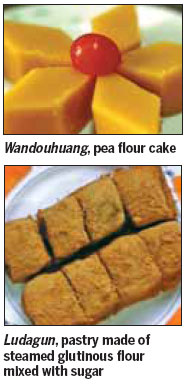Beijing wants to have a bite of heritage list
Updated: 2013-05-07 08:11
By Zheng Xin (China Daily)
|
||||||||

Bidding for the national status aims to prevent traditions from disappearing
The Chinese capital is trying to get its traditional snacks recognized as intangible cultural heritage items.
Beijing has filed an application asking authorities to list more than 100 of its traditional snacks as national "relics".
The move aims to prevent centuries-old culinary traditions from dying out and to ensure better overall food value for consumers, according to Beijing's commerce commission.
If successful, it would mean that dishes such as aiwowo (sticky rice with a sweet filling), douzhi (mung bean milk) and doufunao (bean curd stew) will be enjoyed by future generations.
The application, made by the commission and the Beijing Traditional Brands Association, has been submitted to the central government's cultural heritage body.
In addition to the application, the city is also considering carrying out a survey of traditional snacks to rank the top small bites.
According to Wang Zuoji, deputy director of the Beijing Folklore Committee and a member of the capital's non-tangible cultural heritage committee, the application may stop traditional food from disappearing.
"Cuisine is all about culture and tradition, and the snacks are the living fossils of the city," he said.
Wang said that despite the capital boasting some 378 varieties of traditional snacks, only about 100 are being eaten these days.
Previous efforts to list many of the individual snacks as cultural heritage items have failed.
"We used to have so many varieties of refreshments, fried, boiled or baked, but many of them only remain in the memory of the old generations," he said.
"In addition to the dishes long lost, many snacks eaten today are not authentic," he said.
Yao Sheng, 66, has lived in Beijing's Dongcheng district all his life.
He said that much of the douzhi, or mung bean milk, sold today is no longer the same that he used to drink years ago.
"The douzhi that I'm used to is made of green beans, but some of it sold nowadays uses yellow beans as its main ingredient, which makes it totally different," he said.
"It's hard to imagine a jiaoquan (crispy fried dough ring), or aiwowo becoming a national cultural heritage," he added.
Wang from the Beijing Folklore Committee said that he is also working on a project to bring back the lost Beijing snacks and rebuild the city's culinary culture.
"We're trying to bring back the lost recipes for some dishes, while restoring the less authentic snacks to what they should be," he said.
"It's really a pity that the ancient culinary culture is being phased out by the city's development," Wang said with a sigh.
zhengxin@chinadaily.com.cn
(China Daily 05/07/2013 page7)

 Michelle lays roses at site along Berlin Wall
Michelle lays roses at site along Berlin Wall
 Historic space lecture in Tiangong-1 commences
Historic space lecture in Tiangong-1 commences
 'Sopranos' Star James Gandolfini dead at 51
'Sopranos' Star James Gandolfini dead at 51
 UN: Number of refugees hits 18-year high
UN: Number of refugees hits 18-year high
 Slide: Jet exercises from aircraft carrier
Slide: Jet exercises from aircraft carrier
 Talks establish fishery hotline
Talks establish fishery hotline
 Foreign buyers eye Chinese drones
Foreign buyers eye Chinese drones
 UN chief hails China's peacekeepers
UN chief hails China's peacekeepers
Most Viewed
Editor's Picks

|

|

|

|

|

|
Today's Top News
Shenzhou X astronaut gives lecture today
US told to reassess duties on Chinese paper
Chinese seek greater share of satellite market
Russia rejects Obama's nuke cut proposal
US immigration bill sees Senate breakthrough
Brazilian cities revoke fare hikes
Moody's warns on China's local govt debt
Air quality in major cities drops in May
US Weekly

|

|







